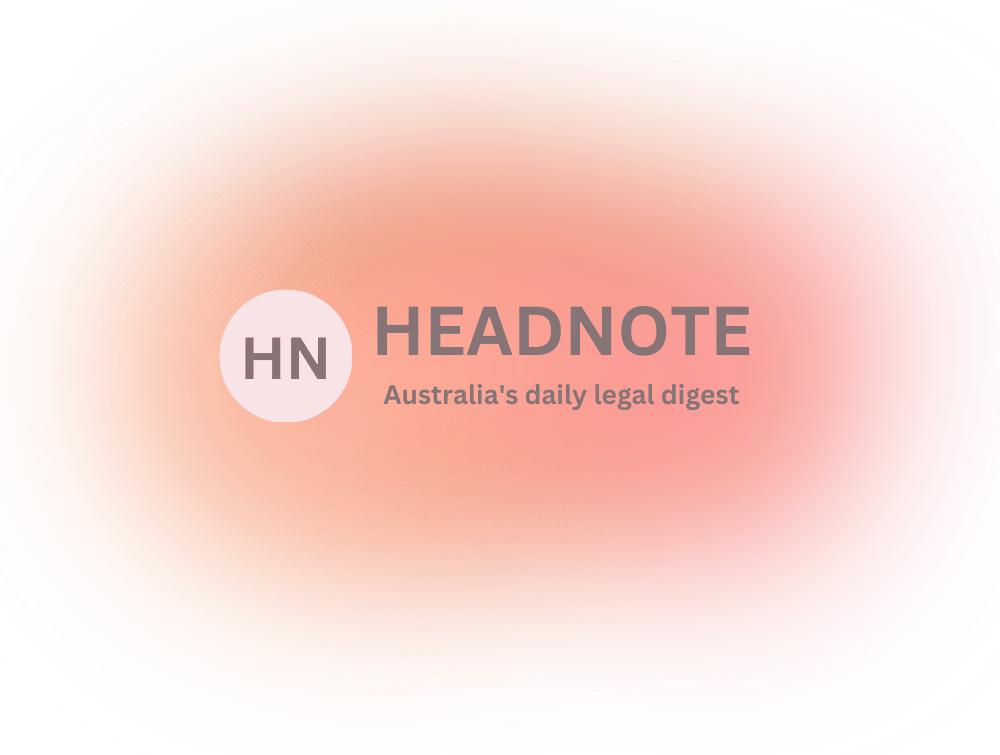
Was this email forwarded to you?
Sign up for our free daily email newsletter at headnote.com.au
Daily wrap
"We have essentially moved to seek our own independent legal advice and we have received that now which essentially outlines that it wouldn't be an issue constitutionally for the state to override this part of the legislation with the West Australian regulations.”
Editor’s picks
Bell CJ at [247] - In a previous judgment, Lantrak Holdings Pty Ltd v Yammine [2023] FCAFC 156 (Lantrak), Jackman J said of his decision in Kane that:
“My remarks were primarily directed to ending the longstanding practice in New South Wales of drafting affidavits in a way which converted a witness’s actual memory of only the gist of a conversation into direct speech, thus giving a false appearance of verbatim memory, prefaced by the confusing formula that the conversation occurred ‘in words to the following effect’.”
[248] It is, in my view and with respect to his Honour, both unorthodox and undesirable for a single judge of any court unilaterally to arrogate to him or herself the “ending [of a] longstanding practice in New South Wales” (or any other jurisdiction). Matters of practice are relied upon by practitioners in the discharge of their daily work, and unilateral change sows confusion and is apt to generate inconsistency and uncertainty amongst the profession. A case for reform of a practice, if subject to persuasive and cogent criticism, is best worked out in and after consultation.’
See also White JA from [283] and Kirk JA from [333]
[20] On Wednesday 5 April, upon the resumption of the proceeding, the judge informed the parties that she had been provided with a further note from one of the jurors. The note read:
On 4 April, 2023, during our deliberations, one of the jurors known as Zac who sits second from the judge’s left in the middle row when we are in the jury box, addressed all jurors and said: “I may be prepared to negotiate with you. I may be prepared to do a deal” – ‘you’ meaning all the jurors. It was said in a firm, loud voice and as though the rest of jurors are beholden or answerable to him. He then referred to some of the charges and said along the lines of: “I may be prepared to say guilty to some charges if you say not guilty to others” as he shuffled through the charges sheet. Another juror said something like, “No, we’re not doing that”. I believe another said, “No, that’s not how it is done”. There were similar comments from others. [Zac’s] response in a loud, intimidating and dismissive voice was, “Fine. I say no to all then”. He then angrily crossed his arms. Apart from this not being anywhere near what we have been asked to do, I saw it as an attempt to intimidate, bribe and coerce us into a decision. It was like he was holding us to ransom.
Craig Lenehan SC presents this public lecture on the topic of liberty as a constitutional value. He will examine the conception of government underlying that idea and how it informs the High Court’s approach to contemporary constitutional issues.
Reflections on the concept of “open justice” - Presented by Debra Mortimer, Chief Justice of the Federal Court of Australia
HPX Group chief executive Nick Humphrey says rolling consulting services into a legal practice means clients have a better chance of taking advantage of legal privilege.
NSW Bar backs compulsory anti-harassment training [AFR paywall]
State bar associations have swung behind the Australian Bar Association’s proposal to mandate “equality and wellbeing” training.
‘Gold rush mentality’: Lawyers pile into AI advice [AFR paywall]
Lawyers are taking advantage of uncertainty around the legal implications of artificial intelligence use to build out new practices in the area.
Abstract - The High Court of Australia is yet to resolve the time when constitutional facts should be assessed. Instead, the Court examines constitutional facts at various points in time, including (1) the legislation’s enactment; (2) the relevant application of the legislation to the plaintiff; and (3) the High Court’s hearing. The time at which constitutional facts are assessed is important, as legislation can shift from valid to invalid over time where the constitutional facts underpinning the legislation’s validity change. This article contends that, generally, constitutional facts should be assessed up until the High Court’s hearing. It is argued that doing so is appropriate because such a timeframe is common to all persons, and enables the Court to reflect changing circumstances by assessing the validity of legislation in its most current context
‘Constitutional Identity and the Right to Attachment’ - Professor Nick Barber, Oxford University
As we continue this month of promoting health and wellbeing in the profession, we speak with Tim Franklin, the lawyer turned ultra-marathon runner, triathlon coach and motivational speaker who has recently become one of 8 people to have quite literally run around the world.
“As a self-proclaimed "succession law nerd," Jennifer Vuu has dedicated her career to the intricacies of wills and estates. She joins us in the studio to reflect on her early life and career inspirations to her current role as Special Counsel at HWL Ebsworth Lawyers, and provides valuable advice for aspiring young lawyers.
Guests: Andy Schmulow, Associate Professor in the School of Law at the University of Wollongong, Dr Jason Harris, Professor of Corporate Law, Interim Deputy Dean and Interim Deputy Head of School at the University of Sydney Law School
Like our free newsletter? The best way to support us is to tell your colleagues about our newsletter!
We welcome your feedback, which you can send to [email protected]